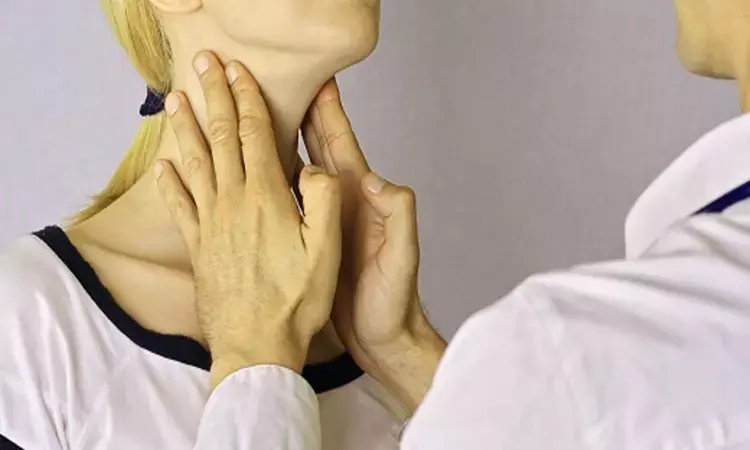- Home
- Medical news & Guidelines
- Anesthesiology
- Cardiology and CTVS
- Critical Care
- Dentistry
- Dermatology
- Diabetes and Endocrinology
- ENT
- Gastroenterology
- Medicine
- Nephrology
- Neurology
- Obstretics-Gynaecology
- Oncology
- Ophthalmology
- Orthopaedics
- Pediatrics-Neonatology
- Psychiatry
- Pulmonology
- Radiology
- Surgery
- Urology
- Laboratory Medicine
- Diet
- Nursing
- Paramedical
- Physiotherapy
- Health news
- Fact Check
- Bone Health Fact Check
- Brain Health Fact Check
- Cancer Related Fact Check
- Child Care Fact Check
- Dental and oral health fact check
- Diabetes and metabolic health fact check
- Diet and Nutrition Fact Check
- Eye and ENT Care Fact Check
- Fitness fact check
- Gut health fact check
- Heart health fact check
- Kidney health fact check
- Medical education fact check
- Men's health fact check
- Respiratory fact check
- Skin and hair care fact check
- Vaccine and Immunization fact check
- Women's health fact check
- AYUSH
- State News
- Andaman and Nicobar Islands
- Andhra Pradesh
- Arunachal Pradesh
- Assam
- Bihar
- Chandigarh
- Chattisgarh
- Dadra and Nagar Haveli
- Daman and Diu
- Delhi
- Goa
- Gujarat
- Haryana
- Himachal Pradesh
- Jammu & Kashmir
- Jharkhand
- Karnataka
- Kerala
- Ladakh
- Lakshadweep
- Madhya Pradesh
- Maharashtra
- Manipur
- Meghalaya
- Mizoram
- Nagaland
- Odisha
- Puducherry
- Punjab
- Rajasthan
- Sikkim
- Tamil Nadu
- Telangana
- Tripura
- Uttar Pradesh
- Uttrakhand
- West Bengal
- Medical Education
- Industry
Novel oral levothyroxine formulation can be taken 15 minutes before breakfast: Study

USA: A novel liquid formulation of levothyroxine, Tirosint-SOL, can be safely administered as early as 15 minutes before breakfast in patients with hypothyroidism, show results from a phase 1 trial.
The findings of the study were presented at the American Academy of Clinical Endocrinology 30th Annual Meeting (AACE 2021) and subsequently published in the journal Endocrine Practice.
Levothyroxine is used for the treatment of hypothyroidism but when taken in the form of a tablet, it has been shown to have significantly decreased absorption with coffee or food ingestion, particularly if containing calcium or magnesium. It is therefore recommended that tablets and soft-gel formulations of levothyroxine be takne at least 30 minutes before meals that causes an inconvenience for patients in the morning.
Tirosint-Sol is a novel solution of levothyroxine that has been shown to result in an approximate 30 minutes faster absorption process than tablets or soft gel formulations.
Murray P. Ducharme, visiting professor at the University of Rhodes, and colleagues, therefore, set out to investigate whether Tirosint-Sol could be administered as late as 15 minutes before a high-fat, high-caloric meal, in comparison to 30 minutes.
For the purpose, the researchers designed a single-center, phase 1, open-label, randomized, single-dose, 2-period, 2-sequence, crossover trial in 36 healthy volunteers. The 36 study participants were administered 600 mcg of levothyroxine sodium after a 10-hour overnight fast and 15 or 30 minutes prior to a high-fat, high-caloric meal. For the purpose of analysis, serum concentrations of levothyroxine were measured using a validated LC-MS method serum samples were taken at 3 different times before dosing and at 0.5, 1, 1.5, 2.5, 3, 4, 6, 8, 10, 12, 16, 24, 48 and 72 hours after dosing.
Of note, the meal used in the study consisted of 2 eggs fried in butter, 2 strips of bacon, 2 slices of toast with butter, 120 g of hash brown potatoes, and 200 mL of whole milk.
Of the 36 patients included in the study, 36 completed all study periods. The 3 who did not complete the trial failed to do so because of failure to undergo COVID-19 testing, vomiting within 6 hours of dosing, and failure to complete the meal.
Key findings of the study include:
- The median Tmax was unchanged between the treatment arms at 1.5 hours.
- The geometric mean ratios and confidence intervals for the baseline adjusted maximum and extent of exposure were within recognized equivalence boundaries, which indicates an absence of meaningful clinical difference when dosing 15 or 30 minutes prior to a meal.
- There were no differences in adverse events and a total of 11 treatment-emergent adverse events were reported during the trial.
- Of the 11 events reported, 10 were graded as mild and 1 was graded as moderate. Additionally, 6 were considered possibly related, 1 was considered unlikely related, and 4 were unrelated.
- No deaths occurred and none of the adverse events that occurred during the trial were considered significant.
"Levothyroxine is a narrow therapeutic index (NTI) drug that requires no interference from food or beverages for consistent dissolution and absorption", said Murray Ducharme in a statement from IBSA Pharma. "The results of this study demonstrate that the wait time needed before breakfast may be shortened to a period of 15 minutes without significant negative effect with the liquid levothyroxine formulation."
Reference:
Abstract #1033492: A Novel Solution of Levothyroxine Results in Clinically Similar Maximum and Extent of Exposure Whether Taken 30 or just 15 Minutes Before a High-Fat High-Caloric Breakfast, was presented at the American Academy of Clinical Endocrinology 30th Annual Meeting (AACE 2021) and subsequently published in the journal Endocrine Practice.
DOI: https://www.endocrinepractice.org/article/S1530-891X(21)01020-X/fulltext
Dr Kamal Kant Kohli-MBBS, DTCD- a chest specialist with more than 30 years of practice and a flair for writing clinical articles, Dr Kamal Kant Kohli joined Medical Dialogues as a Chief Editor of Medical News. Besides writing articles, as an editor, he proofreads and verifies all the medical content published on Medical Dialogues including those coming from journals, studies,medical conferences,guidelines etc. Email: drkohli@medicaldialogues.in. Contact no. 011-43720751


